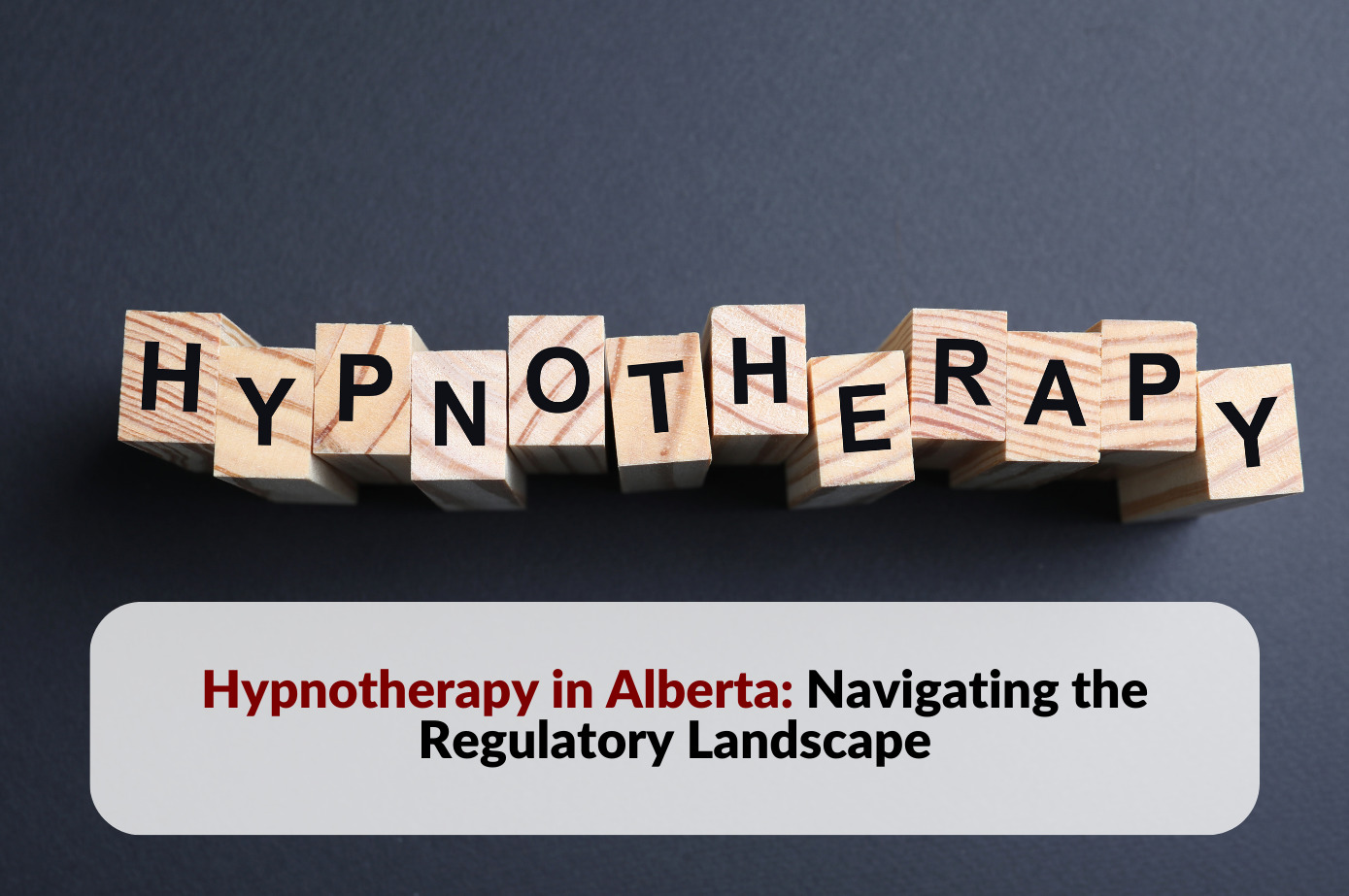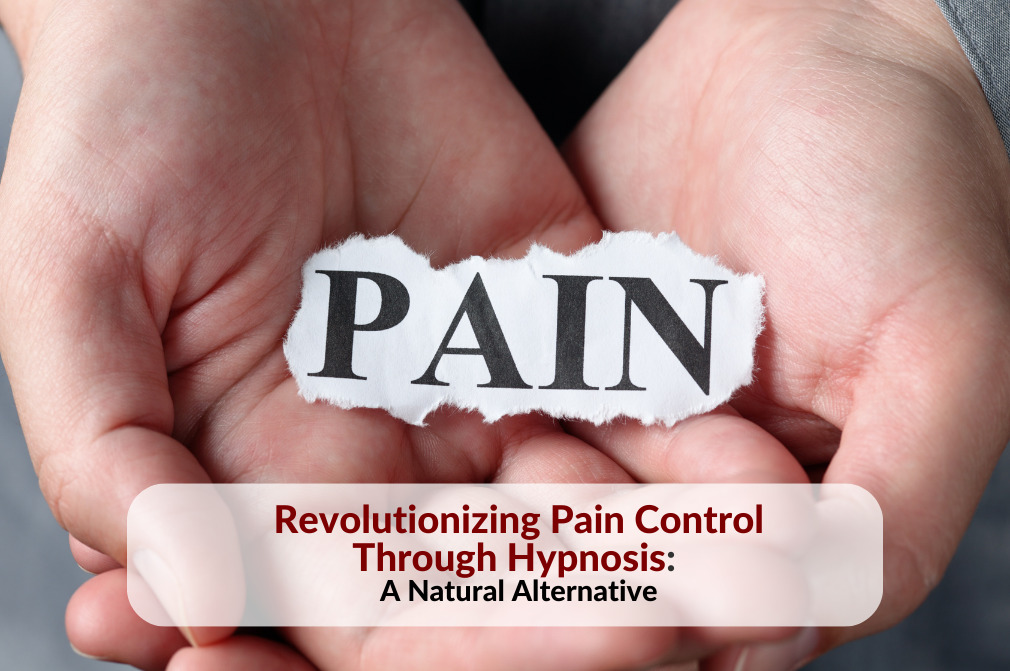Hypnotherapy in Alberta: Navigating the Regulatory Landscape
Hypnotherapy is a fascinating field within integrated healthcare, offering unique therapeutic possibilities. In Canada, particularly in Alberta, it operates as an unregulated sector, meaning that there are no formal licensing requirements in place to oversee Hypnotherapists. However, this doesn’t imply a lack of oversight. Professional societies have stepped in to establish rules, codes of ethics, and regulatory mechanisms to ensure the responsible practice of hypnotherapy.
Professional Societies in Hypnotherapy
Role of Professional Societies
Professional societies play a pivotal role in maintaining standards and ethics within the field of hypnotherapy. They serve as guardians of best practices, ensuring that practitioners adhere to a code of ethics and conduct that prioritizes patient well-being.
Variability in Methods and Processes
These societies may vary in their methods and processes for regulating their members. The specific goals of each organization influence their approach to oversight.
Membership Criteria
Membership in these societies is not granted lightly. Hypnotherapists must meet specific criteria, including educational qualifications, training hours, and adherence to ethical codes. These criteria ensure that members possess the necessary skills and knowledge to practice safely and effectively.
Regulatory Mechanisms
What sets these societies apart are their complaints and disciplinary procedures. These mechanisms are essential for maintaining the standards of member practitioners and addressing any issues that may arise during their practice.
Industry-Leading Educational Requirements: A Double-Edged Sword
While many of these societies are known for setting industry-leading educational requirements, which underscore the significance of continuous learning and professional development, it’s crucial to consider the nuances of this approach. Some argue that these stringent requirements can sometimes unintentionally create barriers for experienced professionals seeking recognition. In certain cases, these requirements may prioritize enrollment in specific courses over recognizing the expertise and knowledge already possessed by practitioners. This alternative perspective challenges the traditional view of industry standards, suggesting that they may inadvertently prioritize commercial interests over the true spirit of education.
Regulating Bodies in Alberta
Alberta Clinical Hypnosis Society (ACHS)
In Alberta, the Alberta Clinical Hypnosis Society (ACHS) is a prominent regulatory body. ACHS oversees licensed health professionals trained in hypnotherapy. To qualify for full membership, individuals, regardless of their prior training credentials, must complete an introductory workshop approved by the society.
Regulatory Organizations Beyond Alberta
Canadian Association for Clinical Hypnotherapists and Educators (CACHE)
CACHE, a non-profit organization, also regulates Hypnotherapy Professionals in Canada. This organization is dedicated to upholding the highest standards of practice and education, ensuring ethical counseling hypnotherapy for the safe enhancement of societal quality of life. CACHE provides training and qualifies candidates for membership. Additionally, it allows non-CACHE trained professionals to challenge their program to meet membership standards by providing evidence of training and passing the appropriate credential examination.
American Council of Hypnotist Examiners (ACHE)
Beyond Alberta, the American Council of Hypnotist Examiners (ACHE) is another organization that plays a significant role in training and regulating Hypnotherapy Professionals. ACHE welcomes both graduates from ACHE-certified schools and trained applicants from non-ACHE certified schools. Trained applicants from non-ACHE certified schools can apply for membership by submitting training documents and proof of three consecutive years of full-time hypnotherapy practice or by taking a qualifying examination.
International Association of Counselors and Therapists (IACT)
The International Association of Counselors and Therapists (IACT) defines a scope of practice for its members that extends beyond traditional hypnotherapy. This organization recognizes the use of hypnotherapy in various allied fields, such as medical practitioners, clinical social workers, licensed massage therapists, nutritionists, special educators, and mental health practitioners. However, IACT recommends that members who solely facilitate hypnosis refrain from activities requiring a license under state or provincial laws and regulations. Members are advised to follow the rules and regulations of their respective professions as required by their state or province. IACT offers various levels of training and memberships to applicants from approved or non-approved IACT instructors.
Association of Registered Clinical Hypnotherapists (ARCH)
The Association of Registered Clinical Hypnotherapists (ARCH) is a nationwide accredited registry for qualified Hypnotherapists and Clinical Counselling Hypnotherapists in Canada. ARCH is a non-profit professional association with the primary goal of promoting professional practice. It offers training and memberships to practitioners from ARCH schools and even provides international memberships. However, international members are held accountable to the accrediting organization in their respective country of practice. ARCH also offers associate memberships to non-certified members of the association, although these members are not recognized or certified to practice Hypnotherapy by ARCH Canada. In conclusion, Non-ARCH Accredited Trained Hypnotherapists are required to successfully complete the ARCH Registered Clinical Hypnotherapy (RCH) Upgrade Course as a mandated minimum requirement to obtain membership.
Pathways to Membership
Completing Approved Workshops
One common pathway to membership in these societies is completing approved workshops. These workshops provide essential training and knowledge, ensuring that practitioners are well-equipped to offer effective hypnotherapy.
Challenges and Examinations
In some cases, individuals can challenge the membership requirements by demonstrating their expertise through examinations. This route allows experienced practitioners to showcase their skills and gain recognition.
Ethical Considerations
Scope of Practice
Ethical considerations in hypnotherapy include defining the scope of practice. While hypnotherapy can be integrated into various allied fields, it’s crucial to understand the boundaries and responsibilities within each profession.
Tying it all Together
In a healthcare landscape where the regulation of hypnotherapy remains decentralized and unstandardized, professional societies play a vital role in ensuring ethical and responsible practice. Through their stringent membership criteria, educational standards, and disciplinary procedures, these societies contribute to the safety and effectiveness of hypnotherapy for patients.
Professional regulation not only benefits practitioners by elevating their skills but also enhances patient confidence and trust in this unique field of integrative healthcare. As the demand for alternative and holistic therapies continues to grow, the role of professional societies in shaping the future of hypnotherapy remains paramount.
To become a hypnotherapist in Alberta, you need to follow a structured path that includes education, training, and potentially joining a professional organization. Here’s a step-by-step guide:
- Educational Background: Start by obtaining a high school diploma or equivalent. A strong educational foundation is essential for this profession.
- Post-Secondary Education: Consider enrolling in a post-secondary program related to psychology, counseling, or hypnotherapy. While Alberta does not have specific educational requirements for hypnotherapists, having a relevant degree or diploma can enhance your credibility.
- Hypnotherapy Training: Seek specialized training in hypnotherapy from reputable institutions. Numerous organizations and schools offer hypnotherapy programs, which can range from a few months to a year or more. Ensure that the program is recognized by professional hypnotherapy associations.
- Hands-On Experience: Gain practical experience by conducting supervised hypnotherapy sessions. This hands-on experience is invaluable for honing your skills and building confidence.
- Join a Professional Organization: While not mandatory, joining a professional hypnotherapy organization like the Alberta Clinical Hypnosis Society (ACHS) can offer networking opportunities, ethical guidance, and access to resources. Some organizations may have specific requirements for membership.
- Certification: Consider obtaining certification as a hypnotherapist. Certification can provide additional credibility and may be required by some clients or organizations.
- Continuing Education: Stay updated with the latest developments in hypnotherapy by attending workshops, seminars, and conferences. Continuing education is crucial for maintaining your skills and knowledge.
- Licensing: As of now, Alberta does not require hypnotherapists to be licensed. However, regulations can change, so it’s essential to stay informed about any developments in licensing requirements.
- Start Your Practice: Once you’ve completed your education, training, and gained experience, you can start your hypnotherapy practice. Building a client base and establishing a positive reputation will be crucial for your success.
Remember that the path to becoming a hypnotherapist may vary based on individual circumstances and goals. It’s essential to research and choose a training program that aligns with your career aspirations.
The cost of hypnotherapy sessions can vary widely depending on several factors, including location, the therapist’s experience, and the specific services offered. On average, hypnotherapy sessions in Alberta can range from $100 to $200 or more per session.
Here are some factors that can influence the pricing of hypnotherapy services:
- Therapist’s Experience: Highly experienced and well-known hypnotherapists may charge higher fees than those who are just starting their careers.
- Location: Hypnotherapy rates can differ between urban and rural areas. Larger cities may have higher costs of living, which can impact pricing.
- Session Duration: The length of a session can affect the price. Standard sessions typically last around 60 minutes, but longer or specialized sessions may cost more.
- Specializations: Some hypnotherapists specialize in specific areas, such as smoking cessation, weight loss, or anxiety management. Specialized sessions may have different pricing.
- Packages: Many therapists offer session packages at a reduced rate compared to single sessions. Clients often find value in purchasing multiple sessions.
- Additional Services: Some hypnotherapists may include additional services or resources in their sessions, which can affect pricing.
It’s essential to research hypnotherapists in your area and inquire about their fees and services. Keep in mind that the cost of hypnotherapy is an investment in your well-being, and the effectiveness of the therapy is often more important than the price. Ensure that you choose a qualified and reputable hypnotherapist who aligns with your needs and goals.
While hypnotherapy can be a valuable and effective therapeutic approach, it’s essential to be aware of potential disadvantages:
- Limited Effectiveness for Everyone: Hypnotherapy may not work equally well for all individuals. Some people are more receptive to hypnosis than others, and the effectiveness can vary depending on the issue being addressed.
- Lack of Regulation: Hypnotherapy is generally unregulated in many places, including Alberta. This lack of regulation means that anyone can call themselves a hypnotherapist, which can lead to inconsistent quality of care.
- Misconceptions and Stigma: Hypnotherapy is often misunderstood, leading to misconceptions and stigma. Some people may be hesitant to try it due to these misconceptions.
- Cost: Hypnotherapy sessions can be relatively expensive, especially if multiple sessions are needed. Cost can be a barrier for some individuals seeking this form of therapy.
- Not a Quick Fix: Hypnotherapy is not a quick-fix solution. It often requires several sessions to achieve the desired results, and clients must be committed to the process.
- Reliance on the Therapist: Some individuals may become overly reliant on their hypnotherapist, which can limit their ability to develop self-help strategies.
- Unwanted Suggestions: In rare cases, individuals undergoing hypnotherapy may be susceptible to unintended suggestions, potentially leading to negative outcomes.
It’s important to approach hypnotherapy with realistic expectations and choose a qualified and ethical hypnotherapist. Discuss any concerns or questions with your therapist before beginning treatment to ensure that it’s the right approach for your needs.
Yes, it is possible to make a living as a hypnotherapist, but several factors can influence your income in this profession:
- Experience: Experienced hypnotherapists often command higher fees, and their reputation can attract more clients.
- Client Base: Building a strong and loyal client base is essential for consistent income. Effective marketing and word-of-mouth referrals can help with this.
- Specialization: Specializing in specific areas, such as smoking cessation, weight loss, or stress management, can attract clients seeking expertise in those areas.
- Location: The demand for hypnotherapy services can vary by location. Larger cities may offer more opportunities, but competition can be higher.
- Marketing and Networking: Effective marketing strategies and networking within the industry can help you reach potential clients and grow your practice.
- Continued Education: Staying updated with the latest techniques and approaches in hypnotherapy can enhance your skills and attract more clients.
- Professionalism: Maintaining a professional and ethical practice is crucial for building trust with clients and sustaining a successful career.
It’s important to note that building a successful hypnotherapy practice may take time, and income can vary. Some hypnotherapists work independently, while others may be employed by healthcare facilities or counseling centers. The income potential can be influenced by the business model you choose and your ability to effectively market your services.
Psychotherapists primarily use talk therapy to help individuals address various mental health issues, relying on conversation and analysis to facilitate change. They often hold degrees in psychology or related fields and may be licensed.
In contrast, hypnotherapists employ hypnosis as a therapeutic tool in addition to talk therapy. Hypnosis involves inducing a trance-like state where individuals are highly focused and receptive to suggestions. Hypnotherapists help clients achieve specific goals or address issues while in this state. While they may have diverse backgrounds, formal education in hypnotherapy is common.
Both professions aim to support individuals in their mental and emotional well-being, but they differ in their approaches, techniques, and the states of consciousness they utilize during therapy. Clients may choose one over the other based on their preferences and the specific issues they wish to address.
Our Experienced Practitioners:
Anjali Nagda 🇬🇧 🇮🇳
Anjali Nagda has been working as a Registered Clinical Hypnotherapist with an extensive academic background in Clinical Psychology, advocating for the powerful potential of utilizing the subconscious mind. Over the past year, Anjali has been navigating the evolving scope of counseling in Alberta, registering herself as a Registered Clinical Counselor with the British Columbia Association of Clinical Counsellors (BCACC) and as a Counseling Therapist with the Association of Counseling Therapists of Alberta (ACTA). Her affiliation with additional regulatory bodies is underway, especially now that clinical counseling can be directly billed.
Anjali combines her expertise as a Registered Clinical Hypnotherapist and a Registered Clinical Counselor to offer integrated services as a Clinical Counseling Hypnotherapist. This dual approach empowers her to work with both the conscious and subconscious minds of her clients. She supplements various conscious therapeutic techniques such as Cognitive Behavior Therapy (CBT), Dialectical Behavior Therapy (DBT), and Rational Emotive Behavior Therapy (REBT), to name a few, which help individuals recognize and change negative thought patterns and behaviors, manage painful emotions, decrease conflict in relationships, and transform irrational beliefs into rational ones. These techniques are particularly effective for treating anxiety, depression, emotional dysregulation, anger, guilt, and unhealthy dependency.
Under hypnotherapy, Anjali employs techniques such as JPMR (Jacobson’s Progressive Muscle Relaxation), Guided Visualizations, Regression Therapy, Parts Integration Therapy, Behavioral Hypnotherapy, Analytical Hypnotherapy, and Inner Child Therapy, among others, to support clients with psychological trauma, specific fears, phobias, anxiety, sleep issues, and more.
Anjali’s invaluable experience at a De-addiction and Rehabilitation Center has given her the opportunity to work closely with individuals grappling with addiction. She focuses on identifying and addressing the underlying triggers that contribute to addictive behaviors, helping clients achieve a natural state of mindfulness and emotional regulation. By incorporating techniques such as Age Regression and Parts Therapy, Anjali empowers her clients to replace their dependency on substances with healthier coping mechanisms and a renewed sense of self-worth.
Anjali’s role has been evolving as her stay in Canada lengthens, driven by her dedication to supporting her clients to the best of her abilities. By combining Clinical Hypnotherapy and Clinical Counseling, she offers a holistic approach not commonly found in the Edmonton market. This unique service allows her to reach more individuals who previously faced barriers due to billing issues.
Anjali’s dedication to her clients’ well-being, combined with her expertise in both Clinical Hypnotherapy and Clinical Counseling, makes her a compassionate and effective guide on their journey towards transformation and healing. Her hard work behind the scenes ensures she can now support a broader range of clients through direct billing, welcoming those who were unable to access her services earlier.
Education:
- Post-Graduate Diploma in Clinical and Applied Hypnotherapy
- Masters in Clinical Psychology
- B.A. Psychology, Journalism, English Literature
Licensure:
- Registered Clinical Counselor, British Columbia Association of Clinical Counsellors (BCACC)
- Counseling Therapist, Association of Counseling Therapists of Alberta (ACTA)
- Registered Clinical Hypnotherapist (RCH), Canada Association Of Counselling Hypnotherapists And Educators (CACHE)
- Certified Hypnotherapist (CH) – National Guild of Hypnotists
Fluency: 🇬🇧 – English | 🇮🇳 – Hindi, Gujarati (fluent); Bengali, Punjabi (conversational)

Anjali Nagda 🇬🇧 🇮🇳
Hypnotherapy
Anjali Nagda has been working as a Registered Clinical Hypnotherapist...





